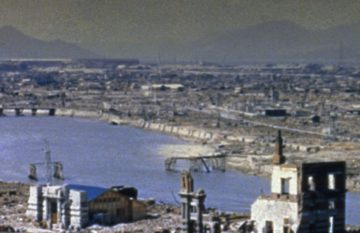Algis Valiunas in The New Atlantis:
 Amid the carnage of the Second World War, which saw some 60 million killed, including the Nazis’ industrialized annihilation of six million Jews, one event stands out in American memory as the most momentous: the atomic bomb attack that leveled Hiroshima on August 6, 1945. According to the most authoritative Japanese casualty count, which is higher than the American figure, the bomb killed some 100,000 people outright and another 40,000 over the next several months; blast, flash burns, and firestorm took care of the former, and radiation sickness accounted for the latter. A second bomb that dropped just three days later on Nagasaki killed 70,000 all told but gave some people misgivings even more troubling than those produced by Hiroshima.
Amid the carnage of the Second World War, which saw some 60 million killed, including the Nazis’ industrialized annihilation of six million Jews, one event stands out in American memory as the most momentous: the atomic bomb attack that leveled Hiroshima on August 6, 1945. According to the most authoritative Japanese casualty count, which is higher than the American figure, the bomb killed some 100,000 people outright and another 40,000 over the next several months; blast, flash burns, and firestorm took care of the former, and radiation sickness accounted for the latter. A second bomb that dropped just three days later on Nagasaki killed 70,000 all told but gave some people misgivings even more troubling than those produced by Hiroshima.
Political men at the time understood, or at least appreciated sufficiently to exult in, the historic scale of the devastation. Upon getting word of the successful mission, while he was returning to the United States from the Potsdam Conference in Germany, President Harry Truman, ultimately responsible for the bombing, let off an exclamation of fiery triumph: “This is the greatest thing in history!”
More here.
